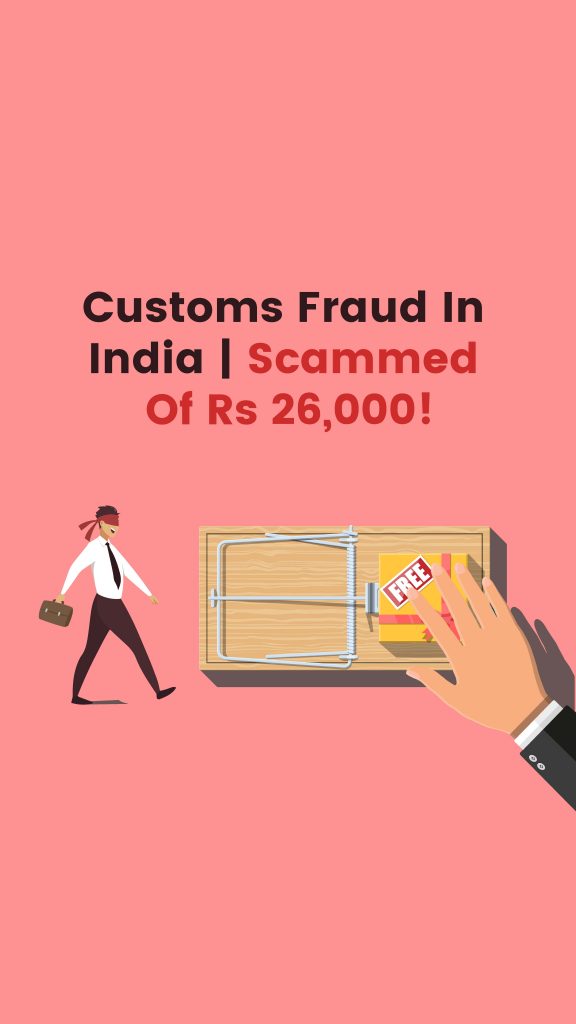One of the key components of daily life, which we always try to make you aware of are the various scams and frauds. Believing in people and looking for investment may lead you to such unwanted scams. We’ve already spoken about mobile tower installation fraud, banking frauds, restaurant GST frauds, fake data entry jobs fraud and more. In this article, we will discuss the ongoing racket of customs fraud.

Table of Contents
Case Study 1
Sonali was befriended by James Felix on Facebook. James was currently living in Britain and ran a business. The profile and person seemed genuine so she struck a conversation with him. Upon talking, James asked her if she liked shopping. When she said yes, he promised to shop some things for her and parcel them to her in India. He even took her residential address for this purpose. After a few days, James pinged Sonali on Facebook to let her know that he was going to courier a gift for her. Furthermore, he said that since he was living in the UK he did not have any Indian currency to pay the customs. Hence, he was sending some European Pounds in an envelope along with the courier for customs payment.
James also gave Sonali a courier receipt and tracking id. Fast forward a few more days, Sonali receives a call from the Delhi customs office. They ask her to come down and collect a parcel. But since Sonali was busy she said she could not afford to travel so far. The customs executive offered her an alternative. The executive gave her her personal bank account number and asked Sonali to transfer Rs 26,000 as customs there. She would make the customs payment for Sonali and send the parcel her way.
So Sonali went ahead and made the amount transfer. One day post this Sonali received another call. They told her that her parcel was scanned and it contained one kg gold and one lakh pound. Thus, it was being transferred to the crime branch. She was asked to pay Rs 98,000 as a penalty to collect the parcel. On further inspection by Sonali, it was found that the bank account, email id and customs executive number were all fake. When Sonali confronted James on the matter, he immediately cut all contact with her and went radio silent.
Case Study 2
Mahesh liked playing an online game and was even part of a Facebook group of its followers. There he got acquainted with Laura from the US and became friends with her. When Laura told Mahesh that she was into stock trading, he expressed his wish to do the same to earn some money. Laura said she would help him out. All he needed was a laptop. She promised to send him a laptop saying that he could pay her back once he made some profit from the trading.
After a few days, Laura sent Mahesh the tracking id of a parcel. Moreover, since she did not have an Indian bank account, she asked Mahesh to pay the customs charge. She had additionally sent $1000 in the parcel to repay Mahesh for it. Similarly, when Mahesh checked online, his parcel was on the way from the US. Two days hence, he received a customs executive call to make the customs payment for Rs 22,000. Mahesh was also given a bank account number to make the transfer.
Post the transfer he got a call saying his parcel was scanned. His parcel had money in it so he must pay Rs 78,000 for an anti-money laundering certificate to receive it. Upon further contact with Laura, all conversations came to a halt. All phone numbers, email accounts, bank accounts became untraceable. In both the case, the banks refused to help since the money was transferred by the account holders of their own accord.
How to detect customs fraud?
- All kinds of frauds have a way of emotionally triggering you. This makes your logic take a backseat. Upon further thinking, it may seem unreasonable for a stranger to send you an expensive gift from overseas. Take this as a customs fraud hint.
- Whenever you get a tracking id link, always check the authenticity of the website first. Check if the website logo looks genuine, if the contact emails have the domain server name, if the social media links actually work and if the website domain name is genuine. These are all tell-tale signs of distinguishing between a real and a fake website.
- The customs department never calls you to notify of a parcel. The customs department sents a letter which asks to make the customs payment on their website. Only customs fraud cases may give your their bank account to make payment.
- Authentic customs email id will end with gov.in, just like other real government emails. But if your email is from a random id then it most probably is a customs fraud case.
Watch the video below to understand and beware of customs fraud.
Join the LLA telegram group for frequent updates and documents.
Download the telegram group and search ‘Labour Law Advisor’ or follow the link – t.me/JoinLLA
It’s FREE!



